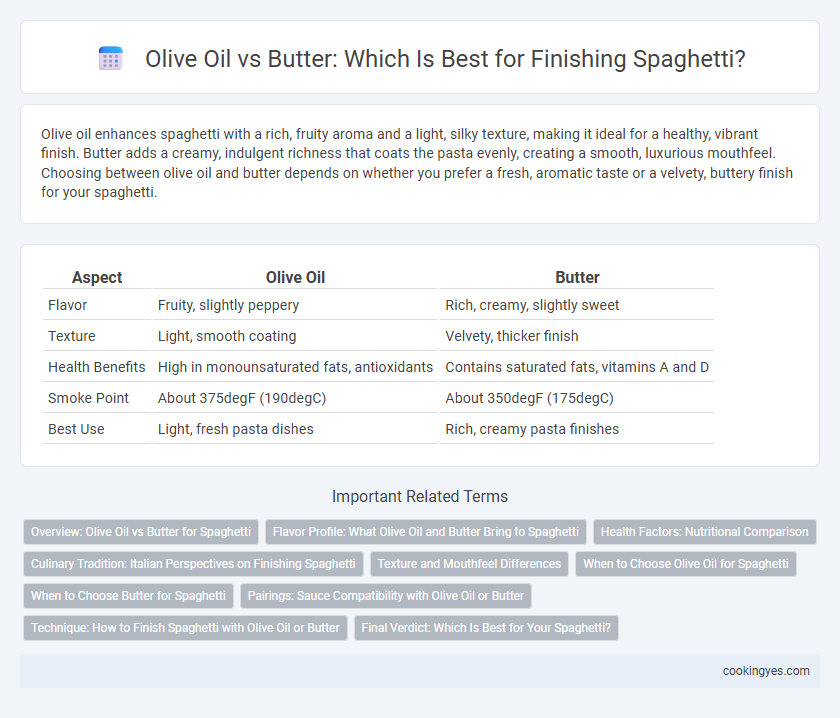Olive oil enhances spaghetti with a rich, fruity aroma and a light, silky texture, making it ideal for a healthy, vibrant finish. Butter adds a creamy, indulgent richness that coats the pasta evenly, creating a smooth, luxurious mouthfeel. Choosing between olive oil and butter depends on whether you prefer a fresh, aromatic taste or a velvety, buttery finish for your spaghetti.
Table of Comparison
| Aspect | Olive Oil | Butter |
|---|---|---|
| Flavor | Fruity, slightly peppery | Rich, creamy, slightly sweet |
| Texture | Light, smooth coating | Velvety, thicker finish |
| Health Benefits | High in monounsaturated fats, antioxidants | Contains saturated fats, vitamins A and D |
| Smoke Point | About 375degF (190degC) | About 350degF (175degC) |
| Best Use | Light, fresh pasta dishes | Rich, creamy pasta finishes |
Overview: Olive Oil vs Butter for Spaghetti
Olive oil enhances spaghetti with a rich, fruity flavor and promotes heart-healthy benefits due to its high monounsaturated fat content and antioxidants. Butter adds a creamy, mellow texture and richness, providing a smooth mouthfeel with saturated fats that contribute to flavor depth. Choosing between olive oil and butter for finishing spaghetti depends on desired taste profiles and health considerations, balancing lightness and nutritional value against indulgent creaminess.
Flavor Profile: What Olive Oil and Butter Bring to Spaghetti
Olive oil adds a fruity, peppery, and slightly bitter flavor to spaghetti, enhancing the dish with Mediterranean richness and a fresh, herbaceous note. Butter imparts a creamy, sweet, and nutty taste, creating a smooth and luxurious texture that coats the pasta evenly. Combining both olive oil and butter balances brightness with richness, elevating the overall flavor profile of spaghetti.
Health Factors: Nutritional Comparison
Olive oil contains high levels of monounsaturated fats and antioxidants, such as vitamin E and polyphenols, which contribute to heart health and reduce inflammation. Butter, rich in saturated fats and cholesterol, may increase the risk of cardiovascular diseases when consumed excessively. Choosing olive oil for spaghetti finishing provides essential fatty acids and beneficial compounds that support overall wellness.
Culinary Tradition: Italian Perspectives on Finishing Spaghetti
Italian culinary tradition favors finishing spaghetti with olive oil due to its rich history rooted in Mediterranean agriculture and health benefits. Olive oil enhances the pasta's flavor profile with fruity and peppery notes while maintaining a light texture, contrasting with butter's creamy richness, which is less common in authentic Italian recipes. Regional variations exist, but the emphasis remains on olive oil as a symbol of Italian gastronomy and purity in spaghetti preparation.
Texture and Mouthfeel Differences
Olive oil imparts a silky, smooth texture to spaghetti, enhancing the mouthfeel with a light, fruity coating that prevents clumping. Butter, rich in milk fats, delivers a creamy, velvety finish, adding a luscious, indulgent mouthfeel that coats each strand more thickly. The choice between olive oil and butter significantly influences the spaghetti's tactile experience, with olive oil favoring a lighter, glossier finish and butter providing a richer, more luxurious texture.
When to Choose Olive Oil for Spaghetti
Choose olive oil for finishing spaghetti when aiming for a lighter, healthier option that enhances the pasta's natural flavors without overpowering them. Olive oil, particularly extra virgin, adds a fruity, peppery note and contributes beneficial antioxidants and healthy monounsaturated fats. It's ideal for dishes featuring fresh herbs, garlic, or seafood, where a clean, vibrant finish complements delicate ingredients.
When to Choose Butter for Spaghetti
Choose butter for finishing spaghetti when seeking a rich, creamy texture and a slightly sweet, nutty flavor that enhances simple sauces like garlic and Parmesan. Butter melts smoothly and blends well with pasta water, creating a silky sauce that clings to the noodles for a luxurious mouthfeel. This dairy-based fat is ideal for delicate dishes where you want to add depth without overpowering fresh herbs or subtle ingredients.
Pairings: Sauce Compatibility with Olive Oil or Butter
Olive oil pairs exceptionally well with tomato-based and herb-infused spaghetti sauces, enhancing their fresh and vibrant flavors while adding a fruity undertone. Butter complements cream-based and cheese-rich sauces, providing a rich, smooth texture that balances acidity and intensifies savory notes. Choosing olive oil or butter depends on the sauce's base and desired mouthfeel, ensuring optimal flavor harmony in spaghetti dishes.
Technique: How to Finish Spaghetti with Olive Oil or Butter
Finishing spaghetti with olive oil involves drizzling extra virgin olive oil over the pasta immediately after draining, then tossing to evenly coat each strand, enhancing flavor and preventing sticking. Using butter requires melting it gently in a pan before adding cooked spaghetti, allowing the pasta to absorb the creamy richness and create a smooth, glossy texture. Both techniques rely on warm fat emulsifying with pasta water and starch to produce a silky, flavorful finish.
Final Verdict: Which Is Best for Your Spaghetti?
Olive oil enhances spaghetti with a rich, fruity aroma and is ideal for a healthier, Mediterranean-inspired dish rich in monounsaturated fats and antioxidants. Butter imparts a creamy, indulgent texture with a slightly nutty flavor that complements traditional Italian recipes, providing a luscious mouthfeel due to its saturated fat content. For the best finish, choose olive oil for a light, fresh taste and better heart health, or butter for a decadent, silky finish depending on your flavor preference and dietary goals.
Olive oil vs butter for spaghetti finishing Infographic

 cookingyes.com
cookingyes.com